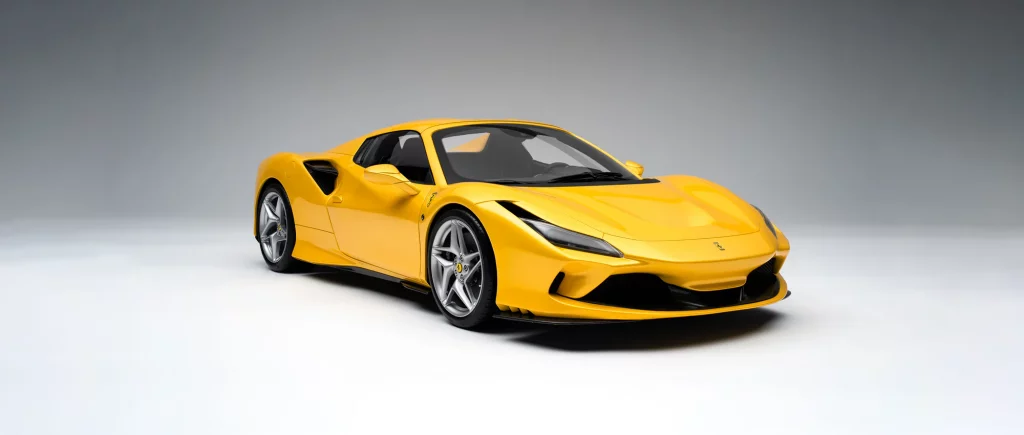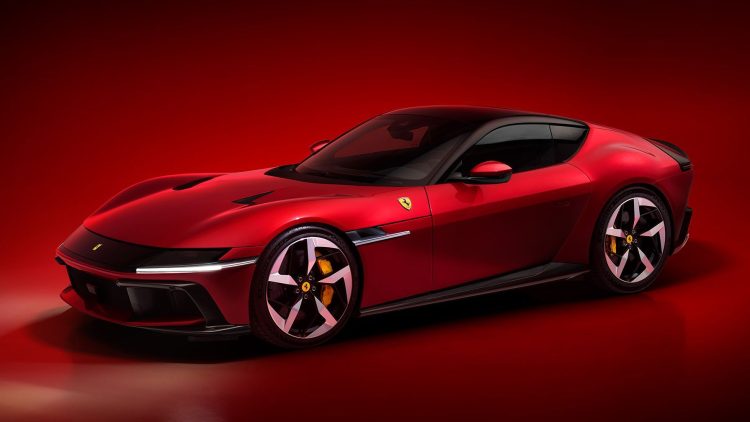Introduction: Ferrari – The Pinnacle of Automotive Passion
Ferrari has long been regarded as the epitome of automotive excellence, synonymous with performance, luxury, and engineering brilliance. For over seven decades, the Ferrari name has evoked a sense of prestige and passion, influencing not only the automotive world but also the realms of motorsport, design, and popular culture. But how has Ferrari managed to maintain this iconic status in an era where technology and consumer preferences are rapidly evolving?
Founded in 1939 by Enzo Ferrari, the brand has transformed from a small racing team into a global symbol of luxury sports cars. Whether it’s the thrill of a Ferrari 488 Pista or the exclusivity of a Ferrari LaFerrari, every model that bears the prancing horse badge is an expression of uncompromising performance, precision engineering, and luxury craftsmanship.
In this article, we’ll explore the factors behind Ferrari’s enduring appeal. From its engineering innovations to its design philosophy, from its motorsport success to its ability to adapt to modern consumer trends, we will look at how Ferrari has not only survived but thrived, despite challenges that have reshaped the global automotive landscape. This comprehensive analysis will delve into Ferrari’s performance milestones, technological advancements, sustainability efforts, and its cultural influence, aiming to answer the question: How has Ferrari managed to remain an automotive icon over the decades?
1. Ferrari’s Heritage: A Foundation Built on Racing Pedigree
Enzo Ferrari’s Vision and the Birth of Ferrari
Ferrari’s journey began in 1939, when Enzo Ferrari founded Auto Avio Costruzioni, a company that initially produced machine tools and aircraft accessories. However, it wasn’t long before Ferrari turned his attention to motorsport, and in 1947, Ferrari’s first official road car, the 125 S, was introduced to the world. Powered by a 1.5-liter V12 engine, this car laid the foundation for Ferrari’s iconic focus on performance, innovation, and engineering precision.
The brand’s success in motor racing played a crucial role in establishing its global reputation. Ferrari’s participation in Formula 1, starting in 1950, became a key part of the brand’s identity. Ferrari’s dominance in motorsport, particularly Formula 1, would fuel its legacy, as the company proved its cars could compete at the highest levels of motorsport.
- Formula 1 Success: Ferrari’s record in Formula 1 is legendary, with a history that includes 16 Constructors’ Championships and 15 Drivers’ Championships. The brand’s F1 cars are known for their speed, handling, and technical innovation, and the Ferrari Formula 1 team is one of the most successful and prestigious teams in the sport’s history.
Racing Influence on Road Cars
Ferrari has always bridged the gap between motorsport and road cars. The company’s racing success provided invaluable insights into engineering, aerodynamics, and performance, which were then applied to Ferrari’s production cars. This symbiotic relationship between racing and road cars allowed Ferrari to continually push the boundaries of performance and design, creating vehicles that were not only fast but also luxurious and capable of delivering thrilling driving experiences.
Ferrari’s commitment to motorsport has fostered a culture of innovation and excellence, allowing the brand to remain at the forefront of automotive development. The company’s involvement in Le Mans, Formula 1, and other prestigious events has also contributed to the brand’s cultural significance, as Ferrari cars are often seen as a symbol of automotive perfection.
2. Ferrari’s Technological Advancements: Leading the Charge in Innovation
Performance Technology: The Heart of Ferrari’s Engineering
Ferrari’s reputation for performance stems from its consistent commitment to developing advanced technology that pushes the limits of what a car can achieve. Each Ferrari model is a showcase of cutting-edge engineering, from the aerodynamics to the powertrain. Ferrari has pioneered numerous technologies that have set new benchmarks for the entire automotive industry.
The Ferrari V12 Engine: A Symbol of Power and Precision
The V12 engine is perhaps Ferrari’s most iconic engineering feat. Initially developed in the early years of the brand, the V12 has remained a centerpiece of Ferrari’s performance DNA. The V12 engines used in models like the Ferrari 812 Superfast and the Ferrari GTC4Lusso offer unparalleled performance, delivering over 800 horsepower and producing a spine-tingling engine note that has become synonymous with the Ferrari brand.
- Hybrid Technology: The Ferrari SF90 Stradale: Ferrari’s transition into the world of hybrid powertrains marks a significant leap in technological innovation. The Ferrari SF90 Stradale is the brand’s first plug-in hybrid hypercar, combining a 4.0-liter twin-turbo V8 with three electric motors to deliver a total output of 986 horsepower. This model is a testament to Ferrari’s ability to adapt to the modern automotive landscape while maintaining its commitment to performance and driving pleasure.
Ferrari and Carbon Fiber: Lightweight and Performance
Ferrari has been at the forefront of adopting lightweight materials like carbon fiber to enhance vehicle performance and handling. The use of carbon fiber in the construction of the Ferrari LaFerrari, for example, allowed the car to achieve a remarkable power-to-weight ratio, contributing to its extraordinary speed and agility.
In addition to carbon fiber, Ferrari also employs aluminum and magnesium to reduce weight while maintaining strength and rigidity, ensuring that every car delivers superb handling, quick acceleration, and uncompromising performance.
Ferrari’s Smart Technology: Infotainment and Connectivity
In recent years, Ferrari has integrated smart technologies into its vehicles to improve the driving experience. The latest Ferrari models feature advanced infotainment systems, including Apple CarPlay, Android Auto, and Ferrari’s proprietary multimedia interface, ensuring that drivers stay connected while on the road.
While the brand remains focused on the driving experience, Ferrari has also embraced driver-assist technologies, including adaptive cruise control, lane departure warning, and parking sensors, all while maintaining a focus on the purity of the driving experience.

3. Ferrari’s Design Philosophy: A Marriage of Beauty and Function
Timeless Aesthetics: The Ferrari Design Legacy
Ferrari’s design philosophy has always been about creating timeless beauty that is both functional and aesthetically stunning. From the early days of Ferrari’s iconic Barchetta designs to the bold and aggressive lines of today’s models like the Ferrari Roma and Ferrari F8 Tributo, Ferrari cars have always been designed to evoke emotion.
The brand works closely with renowned design houses like Pininfarina and Maserati’s own Centro Stile to develop cars that are not only high-performance machines but also works of automotive art. The design of every Ferrari is an expression of its engineering prowess, with elements like aerodynamic efficiency and emotional appeal carefully balanced.
- The Ferrari 250 GTO: One of the most famous Ferrari designs of all time, the 250 GTO has become a symbol of Ferrari’s ability to merge beauty with performance. With only 39 units ever produced, the 250 GTO is one of the most coveted cars in automotive history and is considered one of the greatest examples of automotive design.
- Modern Ferrari Design: More recently, cars like the Ferrari LaFerrari and Ferrari Portofino have pushed the boundaries of modern automotive design, combining sleek curves with aggressive lines that speak to Ferrari’s racing heritage while embracing modern trends in aerodynamics and technology.
The Driving Experience: Ferrari’s Commitment to Pure Pleasure
While design plays a central role in Ferrari’s vehicles, the ultimate goal is to create cars that deliver unmatched driving experiences. Every Ferrari model is engineered to offer a dynamic and thrilling ride, from the handling precision to the feedback from the steering wheel. Ferrari cars are built to inspire a connection between driver and machine, offering both comfort and adrenaline-pumping excitement.
Ferrari’s double-clutch transmission, active aerodynamics, and rear-wheel drive layouts are all part of a holistic approach to driving performance, ensuring that every Ferrari offers an engaging experience for those behind the wheel.
4. Ferrari and Sustainability: Embracing the Electric Future
Ferrari’s Commitment to Sustainability
As the world moves toward a more sustainable future, Ferrari is increasingly committed to making its cars greener without sacrificing the brand’s hallmark performance and luxury. Ferrari’s dedication to environmental responsibility is exemplified in its hybrid and electric vehicles, which combine cutting-edge performance with energy efficiency.
The Ferrari SF90 Stradale, as Ferrari’s first plug-in hybrid, is a significant step toward the brand’s goal of achieving carbon neutrality in the coming years. Ferrari’s hybrid technology allows for the perfect balance between performance and sustainability, offering drivers the opportunity to enjoy a thrilling drive while reducing their carbon footprint.
Looking forward, Ferrari is working on developing fully electric vehicles that will carry the Ferrari legacy into the next era of high-performance luxury cars. The company’s ability to balance sustainability with performance excellence will determine its continued relevance in the rapidly changing automotive landscape.
Conclusion: Ferrari’s Timeless Influence on the Automotive World
Ferrari’s ability to maintain its iconic status in the automotive world can be attributed to its unwavering commitment to performance, design, and innovation. From its roots in motorsport to its cutting-edge technologies and timeless designs, Ferrari has consistently set the standard for what a luxury sports car can be.
Despite the rapidly evolving automotive landscape, Ferrari continues to thrive by staying true to its heritage while embracing modern technologies. As it navigates the future, Ferrari remains committed to delivering cars that offer the ultimate driving experience—combining power, luxury, and innovation in a way that few brands can.
In the end, Ferrari’s enduring influence on the automotive industry is a testament to its ability to adapt to new challenges while maintaining the core values that have made it one of the most iconic names in automotive history.


































Discussion about this post